▶ THOMAS L. FRIEDMAN
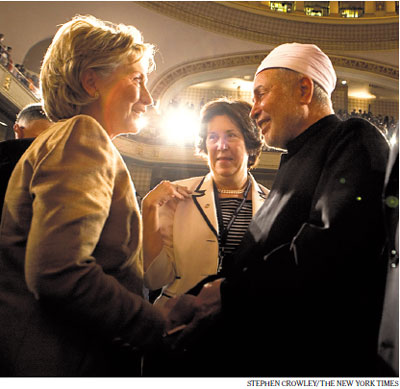
Secretary of State Hillary Clinton greeted guests after President Barack Obama’s speech at Cairo University.
It’s hard to know whether to laugh or cry after reading the reactions of analysts and officials in the Middle East to President Obama’s Cairo speech. “It’s not what he says, but what he does,” many said. No, ladies and gentlemen of the Middle East, it is what he says and what you do and what we do. We must help, but we can’t want democracy or peace more than you do.What should we be doing? The follow-up to the president’s speech will have to be led by Secretary of State Hillary Clinton. This will be her first big test, and, for me, there is no question as to where she should be putting all her energy: on the peace process.
No, not that peace process - not the one between Israelis and Palestinians. That one’s probably beyond diplomacy. No, I’m talking about the peace process that is much more strategically important - the one inside Iraq.
The most valuable thing that Mrs. Clinton could do right now is to lead a sustained effort - along with the U.N., the European Union and Iraq’s neighbors - to resolve the lingering disputes between Iraqi factions before we complete our withdrawal. (We’ll be out of Iraq’s cities by June 30 and the whole country by the close of 2011.)
Why? Because if Iraq unravels as we draw down, the Obama team will be blamed, and it will be a huge mess. By contrast, if a decent and stable political order can take hold in Iraq, it could have an extremely positive impact on the future of the Arab world and on America’s reputation.
I have never agreed with the argument that Iraq was the bad war, Afghanistan the good war and Pakistan the necessary war. Folks, they’re all one war with different fronts. It’s a war within the Arab- Muslim world between progressive and anti-modernist forces over how this faith community is going to adapt to modernity - modern education, consensual politics, the balance between religion and state and the rights of women. Any decent outcome in Iraq would bolster all the progressive forces by creating an example of something that does not exist in the Middle East today - an independent, democratizing Arab-Muslim state.
“The reason there are no successful Arab democracies today is because there is no successful Arab democracy today,” said Larry Diamond, a professor at Stanford University the author of “The Spirit of Democracy.” “When there is no model, it is hard for an idea to diffuse in a region.”
Rightly or wrongly, we stepped into the middle of this war of ideas in the Arab-Muslim world in 2003 when we decapitated the Iraqi regime, wiped away its authoritarian political structure and went about clumsily midwifing something that the modern Arab world has never seen before - a horizontal dialogue between the constituent communities of an Arab state. In Iraq’s case, that is primarily Sunnis, Shiites and Kurds.
Yes, in a region that has only known top-down monologues from kings, dictators and colonial powers, we have helped Iraqis convene the first horizontal dialogue to write their own social contract for how to share power.
At first, this dialogue took place primarily through violence. Liberated from Saddam’s iron fist, each Iraqi community tested its strength against the others, saying in effect: “Show me what you got, baby.” The violence was horrific and ultimately exhausting for all. So now we’ve entered a period of negotiations over how Iraq will be governed. But it’s unfinished and violence could easily return.
And that brings me to Secretary Clinton. I do not believe the argument that Iraqis will not allow us to help mediate their disputes - whether over Kirkuk, oil-sharing or federalism. For years now, our president, secretary of state and secretary of defense have flown into Iraq, met the leaders for a few hours and then flown away, not to return for months. We need a more serious, weighty effort. Hate the war, hate Bush, but don’t hate the idea of trying our best to finish this right.
This is important. Afghanistan is secondary. Baghdad is a great Arab and Muslim capital. Iraq has something no other Arab country has in abundance: water, oil and an educated population. It already has sprouted scores of newspapers and TV stations that operate freely. “Afghanistan will never have any impact outside of Afghanistan. Iraq can change minds,” said Mamoun Fandy, of the International Institute for Strategic Studies.
You demonstrate that Iraqi Shiites, Sunnis and Kurds can write their own social contract, and you will tell the whole Arab world that there is a model other than topdown monologues from iron-fisted dictators. You will expose the phony democracy in Iran, and you will leave a legacy for America that will help counter Abu Ghraib and torture.
Ultimately, which way Iraq goes will depend on whether its elites decide to use their freedom to loot their country or to rebuild it. That’s still unclear. But we still have a chance to push things there in the right direction, and a huge interest in doing so. Mrs. Clinton is a serious person; this is a serious job. I hope she does it.
스마터리빙
more [ 건강]
[ 건강]이제 혈관 건강도 챙기자!
[현대해운]우리 눈에 보이지 않기 때문에 혈관 건강을 챙기는 것은 결코 쉽지 않은데요. 여러분은 혈관 건강을 유지하기 위해 어떤 노력을 하시나요?
 [ 건강]
[ 건강]내 몸이 건강해지는 과일궁합
 [ 라이프]
[ 라이프]벌레야 물럿거라! 천연 해충제 만들기
 [ 건강]
[ 건강]혈압 낮추는데 좋은 식품
[현대해운]혈관 건강은 주로 노화가 진행되면서 지켜야 할 문제라고 인식되어 왔습니다. 최근 생활 패턴과 식생활의 변화로 혈관의 노화 진행이 빨라지고
사람·사람들
more많이 본 기사
- 삭제된 ‘이민단속 정보공유’ 앱 개발자, 정부 상대 소송 제기
- “이제 베트남도 가기 무섭네”… ‘가방 속 시신 발견’ 이어 또 한국인 사망
- 종전안 머리맞댄 우크라·유럽 정상들… “美와 영토문제 이견”
- 백악관 경제위원장 “금리 인하, 어느 정도 계속돼야 할 것”
- “사업 안 하는데 비즈니스 세금 내라고?”
- 하니 약혼남 근황.. ‘환자 사망’ 양재웅 병원, ‘3개월 업무정지’ 처분
- 어쩔수가없다·케데헌, 골든글로브 각 3개 부문 후보 올라
- 대한민국, A조 2위로 32강 진출시 LA 온다
- 네타냐후, 29일 트럼프와 회담… ‘가자 평화 2단계’ 논의할듯
- 파라마운트, 워너브러더스 적대적 인수 선언…주식매입 제안
- 한인교사, 9세 여학생에 사탕 주며 성추행
- ‘95세 버핏’ 은퇴 한달 앞두고 버크셔 경영진 물갈이
- ‘구해줘! 홈즈’ 측 “박나래 출연 중단, 최대한 편집 예정”
- 트럼프, AI규제 일원화 예고… “금주 단일규정 행정명령”
- EU, 美 ‘문명 소멸’ 경고에 “내정간섭 마라”
- ‘조폭 지인’ 조세호 폭로 또 “하나씩, 하나씩..”
- 군사 마찰로 번진 ‘일촉즉발’ 중일 갈등…동북아 정세 요동치나
- ‘황규호號’ 평통 시애틀협, 힘찬 출발...방용승 평통 사무처장 참석해 미주지역 처음으로 출범회의 가져
- ‘조 추첨 희비’ 韓 월드컵 랭킹 아시아 1위→일본은 급추락
- “친언니, 물에 빠져 사망”..뼈아픈 가정사 고백한 ‘서울대 출신’ 엘리트 女배우 황석정 [같이 삽시다]
- “평통 해외자문위원 10% 늘리겠다”...방용승 평통 사무처장 시애틀 기자간담회서 밝혀
- 페더럴웨이 경전철 개통에 한인들도 환호...6일 오전 페더럴웨이서 연장 8마일ㆍ3개역 개통식 펼쳐져
- 오타니·소토 다 놓쳤던 토론토, 올해도 폭풍 투자 예고... 시즈→폰세 이어 FA 최대어·日 277홈런 거포 정조준
- 시혹스 37-9로 애틀랜타 대파...샤히드 100야드 킥오프 리턴 터치다운 앞세워 대승거둬
- “통일교, 민주당도 지원” 증언 후폭풍…특검 ‘편파수사’ 논란
- 내년 시애틀서 열리는 월드컵 경기들을 보니...벨기에ㆍ이집트, 미국ㆍ호주 등 총 4경기 열려
- 연말 샤핑객 노린 ‘산타사기’ 조심
- 엑소 6人, 초능력 세계관 부활..정규 8집 ‘REVERXE’ 트레일러 공개
- 李대통령, 내달 중순 방일…다카이치 고향서 정상회담 추진
- 쿠팡 이용자 나흘만에 181만명 줄어…이탈 본격화
- 워싱턴 한인 입양인 20명 모국투어
- “내년 워싱턴 집값 하락 예상”
- 공무원이 ‘실업수당 사기’ LA카운티… 1
- 美 “오커스 전력 다하고 있다”…호주와 핵잠 협력 지속 공식화
- 돈과 행복
- 친(親)중 좌파정권 대청소 작전이라고… 1
- 뉴욕시 추방 이민자수, 체포자수 넘어
- 올해 82세 포르셰 회장 62세 여친과 4번째 결혼
- 부고-장종언 전 메릴랜드한인회장
- “요리하며 한국어와 문화 배워요”
- 커뮤니티센터 1층 대강당 카펫, 마룻바닥으로 교체
- 한양대동문회 송년회 소병훈 신임회장 선출 “
- 워싱턴 지역 올겨울 첫 눈
- 손성대 장로·손옥아 권사 부부 더나눔하우스 거주자 식사 대접
- ‘출생시민권 금지’ 명령, 대법원서 위헌성 따진다
- [조지 F. 윌 칼럼] 도덕적 시궁창에 빠진 트럼프 행정부
- AI해고·관세·고임금 ‘겹악재’… 요식업계 ‘직격탄’
- “국경일 행사, 한인회 공동 주최”
- 또 음주운전 역주행 참사, 2명 사망·1명 부상
- 숙명여대동문회 송년모임 “내년 50주년 준비”
1/5지식톡

-
 테슬라 자동차 시트커버 장착
0
테슬라 자동차 시트커버 장착
0테슬라 시트커버, 사놓고 아직 못 씌우셨죠?장착이 생각보다 쉽지 않습니다.20년 경력 전문가에게 맡기세요 — 깔끔하고 딱 맞게 장착해드립니다!장착비용:앞좌석: $40뒷좌석: $60앞·뒷좌석 …
-
 식당용 부탄가스
0
식당용 부탄가스
0식당용 부탄가스 홀세일 합니다 로스앤젤레스 다운타운 픽업 가능 안녕 하세요?강아지 & 고양이 모든 애완동물 / 반려동물 식품 & 모든 애완동물/반려동물 관련 제품들 전문적으로 홀세일/취급하는 회사 입니다 100% …
-
 ACSL 국제 컴퓨터 과학 대회, …
0
ACSL 국제 컴퓨터 과학 대회, …
0웹사이트 : www.eduspot.co.kr 카카오톡 상담하기 : https://pf.kakao.com/_BEQWxb블로그 : https://blog.naver.com/eduspotmain안녕하세요, 에듀스팟입니다…
-
 바디프렌드 안마의자 창고 리퍼브 세…
0
바디프렌드 안마의자 창고 리퍼브 세…
0거의 새제품급 리퍼브 안마의자 대방출 한다고 합니다!8월 23일(토)…24일(일) 단 이틀!특가 판매가Famille: $500 ~ $1,000Falcon: $1,500 ~ $2,500픽업 & 배송직접 픽업 가능LA…
-
 바디프렌드 안마의자 창고 리퍼브 세…
0
바디프렌드 안마의자 창고 리퍼브 세…
0거의 새제품급 리퍼브 안마의자 대방출 한다고 합니다!8월 23일(토)…24일(일) 단 이틀!특가 판매가Famille: $500 ~ $1,000Falcon: $1,500 ~ $2,500픽업 & 배송직접 픽업 가능LA…
케이타운 1번가
오피니언
 옥세철 논설위원
옥세철 논설위원친(親)중 좌파정권 대청소 작전이라고?

돈과 행복
 조지 F·윌 워싱턴포스트 칼럼니스트
조지 F·윌 워싱턴포스트 칼럼니스트 [조지 F. 윌 칼럼] 도덕적 시궁창에 빠진 트럼프 행정부
 조형숙 시인·수필가 미주문협 총무이사
조형숙 시인·수필가 미주문협 총무이사 바람이 분다
 한영일 / 서울경제 논설위원
한영일 / 서울경제 논설위원[만화경] ‘청탁 통로’ 된 ‘소통 창구’

‘배타적 시민권 법안’ 주시하고 대처해야

올 연말, 음주운전만은 피하자
 손영아 문화 칼럼니스트·YASMA7 대표
손영아 문화 칼럼니스트·YASMA7 대표 [손영아 문화산책] 두다멜 이후의 LA필, 새로운 스타를 향한 긴 탐색
 마크 A. 시쎈 / 워싱턴포스트 칼럼니스트
마크 A. 시쎈 / 워싱턴포스트 칼럼니스트 [마크 A. 시쎈 칼럼] 트럼프의 ‘마약선 타격’ 각본은 오바마가 썼다
1/3지사별 뉴스

‘2025 경제인의 밤’ 성황
뉴욕한인경제인협회(회장 이창무)가 지난 5일 뉴저지 포트리 더블트리 호텔에서 개최한 ‘2025 경제인의 밤’ 행사가 150여명의 회원과 각계 …
‘신생아 B형간염 접종 권고’34년 만에 폐기

“내년 워싱턴 집값 하락 예상”
내년에는 워싱턴 일원의 집 값은 다소 떨어지고 볼티모어는 오를 것이라는 전망이 나왔다.부동산 매물정보 사이트인 ‘브라이트 MLS’가 최근 발표…
워싱턴 한인 입양인 20명 모국투어

어쩔수가없다·케데헌, 골든글로브 각 3개 부문 후보 올라
박찬욱 감독의 영화 ‘어쩔수가 없다’와 K팝 소재 애니메이션 ‘케이팝 데몬 헌터스’(케데헌)가 미국의 권위있는 대중문화상인 골든글로브에서 작품…
스키 시즌 개막***헤븐리 일부 구간 운영중

오늘 하루 이 창 열지 않음 닫기 








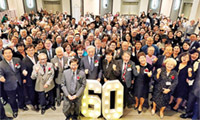
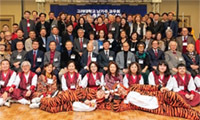




















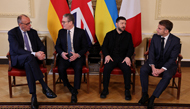



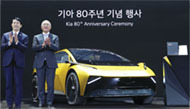

















.png)


댓글 안에 당신의 성숙함도 담아 주세요.
'오늘의 한마디'는 기사에 대하여 자신의 생각을 말하고 남의 생각을 들으며 서로 다양한 의견을 나누는 공간입니다. 그러나 간혹 불건전한 내용을 올리시는 분들이 계셔서 건전한 인터넷문화 정착을 위해 아래와 같은 운영원칙을 적용합니다.
자체 모니터링을 통해 아래에 해당하는 내용이 포함된 댓글이 발견되면 예고없이 삭제 조치를 하겠습니다.
불건전한 댓글을 올리거나, 이름에 비속어 및 상대방의 불쾌감을 주는 단어를 사용, 유명인 또는 특정 일반인을 사칭하는 경우 이용에 대한 차단 제재를 받을 수 있습니다. 차단될 경우, 일주일간 댓글을 달수 없게 됩니다.
명예훼손, 개인정보 유출, 욕설 등 법률에 위반되는 댓글은 관계 법령에 의거 민형사상 처벌을 받을 수 있으니 이용에 주의를 부탁드립니다.
Close
x